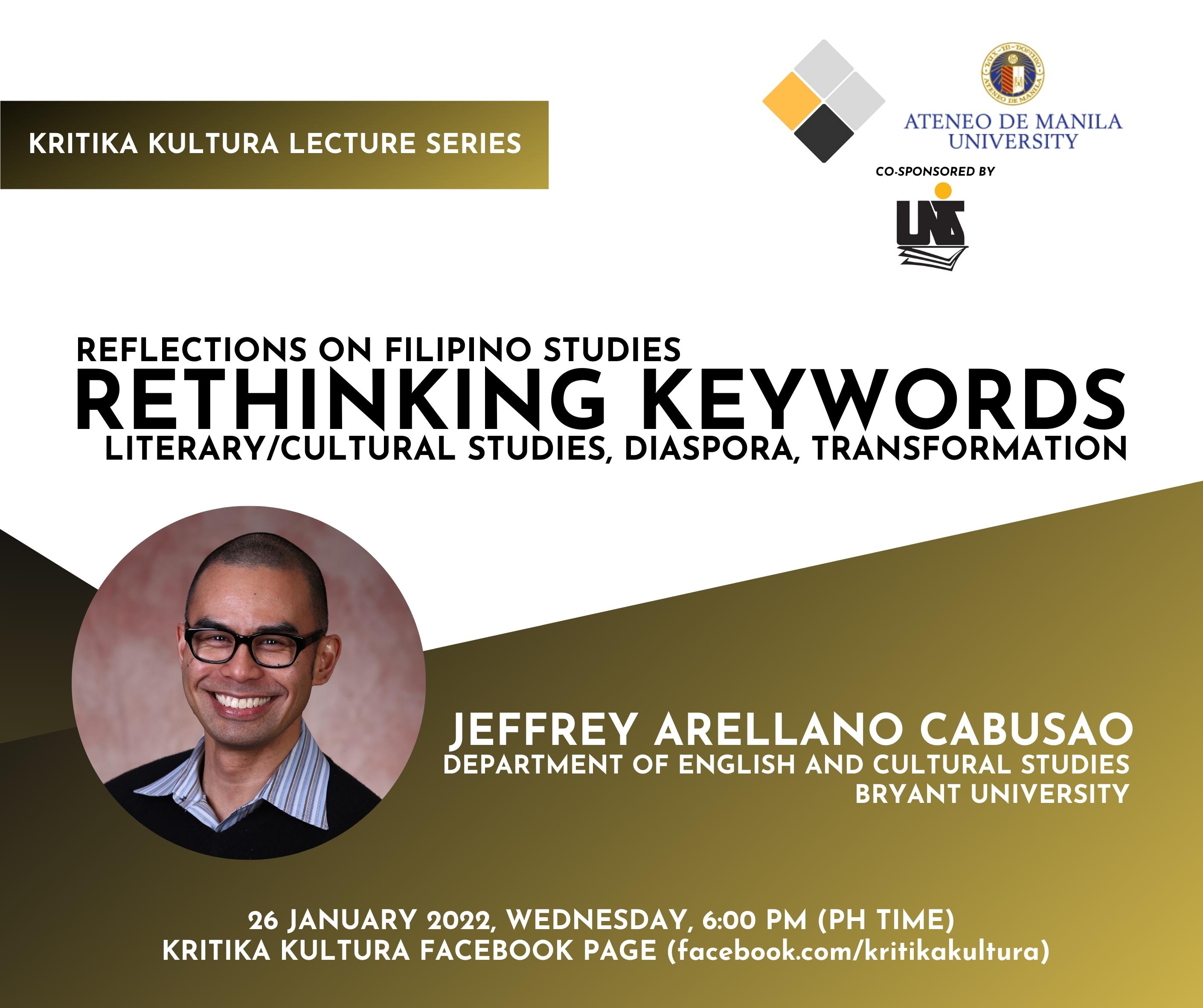
January 19, 2022
Kritika Kultura Lecture Series presents Jeffrey Cabusao’s Rethinking Keywords
In celebration of its 20th anniversary, Kritika Kultura, the international refereed journal of language, literary, and cultural studies of the Department of English, Ateneo de Manila University, is hosting a series of online lectures this 2022.
The first of these lectures is on January 26, 2022, Wednesday, 6:00 p.m. (PH time), and features Professor Jeffrey Arellano Cabusao’s “Reflections on Filipino Studies: Rethinking Keywords–Literary/Cultural Studies, Diaspora, Transformation.” The event will be streamed on the Kritika Kultura Facebook page (facebook.com/kritikakultura), and will be composed of Prof. Cabusao’s pre-recorded talk and a live Q&A with him. The lecture is co-sponsored by UNITAS, the international online peer-reviewed open-access journal of advanced research in literature, culture, and society published by the University of Santo Tomas.
About the Lecture
With a diaspora of over twelve million, Filipinos have become one of the largest Asian American communities in the United States and can be found scattered across the planet. How do we understand the unfolding of the Filipino diaspora in relation to the Philippines? For two decades, the interdisciplinary Kritika Kultura journal has contributed to the broader field of literary and cultural studies. One of the many accomplishments of the journal is its shedding light on how literary and cultural studies could deepen our understanding of the Filipino diaspora and the Filipino experience. In this talk, I’d like to take a look at literary and cultural studies through the lens of Filipino studies, a field which could enable us to discern how literature and culture matter to the lives of Filipinos around the globe. This talk provides an opportunity to reflect upon the concept of Filipino studies which is diasporic in scope while simultaneously attuned to the historical specificity of the Philippines. While Filipino studies is inextricably interconnected with various interdisciplinary formations (literary and cultural studies, Asian American studies, American studies, ethnic studies, etc.), it’s imperative that we continue to reflect upon what constitutes Filipino studies—its methodologies, its objects of study, its goals. How do we imagine the scope and range of Filipino studies in ways that make it relevant to the lives of Filipinos everywhere beyond the boundaries of the academy?
About the Lecturer
Jeffrey Arellano Cabusao is Professor in the Department of English and Cultural Studies at Bryant University in Smithfield, Rhode Island, USA. He teaches various courses in American studies, ethnic studies (Asian American and African American studies), cultural studies/media literacy, and women’s/gender and sexuality studies. Cabusao has contributed to the development of interdisciplinary programs at Bryant (coordinating American Studies, Africana/Black Studies, and Ethnic Studies) and mentoring programs in his field (co-director of the Early Career Educator of Color Leadership Award Program at NCTE – National Council of Teachers of English). Editor of Writer in Exile/Writer in Revolt: Critical Perspectives on Carlos Bulosan and contributor to the Penguin Classics edition of Bulosan’s America Is in the Heart, Cabusao’s work is featured in collections and journals published in the United States, the Philippines, and South Korea. Cabusao’s research interests include Filipino American/Filipino diasporic studies, comparative ethnic studies, and literary and cultural studies.
About Kritika Kultura
Kritika Kultura is acknowledged by a host of Asian and Asian American Studies libraries and scholarly networks and indexed in the MLA International Bibliography, Arts and Humanities Citation Index (Clarivate), Scopus, EBSCO, the Directory of Open Access Journals, and the International Consortium of Critical Theory Programs (ICCTP). Read KK issues and learn about submission guidelines and events on ajol.ateneo.edu/kk or email the editors at kk@ateneo.edu.
